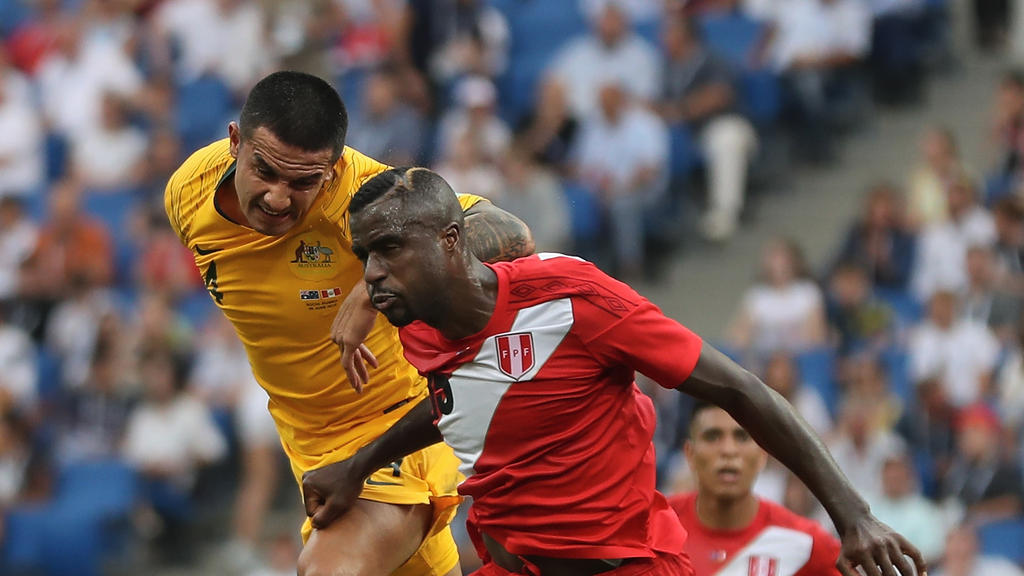Not tall, not fast, but Cahill became a legend anyway

Once dismissed as too small to be a professional, Australia's Tim Cahill, who retired from international football Tuesday, became a giant of the game and his nation's most prolific goalscorer.
Cahill hung up his boots after scoring a record 50 goals in 107 appearances since his debut in 2004, weeks after he played in his fourth World Cup in a cameo appearance against Peru in Russia.
It leaves Australia, who were winless in Russia, with much rebuilding to do under new coach Graham Arnold as they head towards their Asian Cup title defence in January.
"No words can describe what it has meant to represent my country," Cahill tweeted to his fans as he announced his decision.
"Massive thank you to everyone for the support throughout all my years wearing the Australian badge."
The 38-year-old is the last of the Socceroos' "golden generation" of footballers, who became national heroes when they qualified for the 2006 World Cup for the first time in 32 years.
He went on to become the first Australian to net a goal at the World Cup, in Germany, and scored in the next two tournaments in 2010 and 2014.
The Sydney-born footballer's knack for scoring crucial goals led Socceroo fans to adopt the phrase "cometh the hour, cometh Tim Cahill".
"That's why Timmy's Timmy. He's is a great Australian sportsman," former national coach Ange Postecoglou said, after Cahill rescued Australia's stuttering World Cup qualification campaign with a double against Syria last year.
"He's got an international record that stacks up against the best."
In his later career, Cahill adopted the role of elder statesman among his younger team-mates as his contemporaries, including Mark Viduka and Harry Kewell, stepped away from the game.
Born December 6, 1979 in Sydney to a Samoan mother and British father, Cahill almost didn't represent Australia after playing briefly for Western Samoa under-20s.
But after trying for nine years and following an intense lobbying campaign to world body FIFA, he finally received clearance for Australian eligibility and made his debut against South Africa in 2004.
The goals flowed in the following years as the box-to-box midfielder transformed into an outright striker while retaining his outstanding aerial ability.
More than half Cahill's international goals came from headers, even though he stands only 1.78 metres (5ft 10in) tall.
In 2006 in Germany, Cahill struck a late double against Japan that played a critical role in Australia reaching the last 16.
In South Africa in 2010, Cahill scored against Serbia, but the Socceroos were unable to progress from the group stages.
Four years later in Brazil, Cahill found the back of the net against Chile, before unleashing a stunning volley against the Netherlands that was voted by FIFA as one of 2014's greatest goals.
At club level, Cahill made waves in England after joining Millwall's academy as a teenager in 1997, with his parents going into debt to fund his footballing dream, despite critics saying he lacked the height to make it as a professional.
After reaching the 2004 FA Cup final with the second-tier club, he joined Premier League club Everton in 2005, making 256 appearances for the Toffees and scoring 68 goals over the next eight years.
Stints at New York Red Bulls and Shanghai Shenhua followed before he returned home to the A-League in 2016 in a much-hyped move to Melbourne City that failed to meet expectations.
Rarely featuring in City's starting line-up, Cahill quit the Australian club in December to rejoin Millwall on a short-term deal in a bid to make the squad for a fourth World Cup.
But he only made cameo appearances for Millwall, with some critics questioning his inclusion in Bert van Marwijk's Socceroos squad.
Despite playing only a minor role in Russia, Cahill's retirement is set to leave a gaping hole in the Australian line-up and dressing room as they forge ahead without their tireless talisman.
"What youngsters will draw from (Cahill's career) is someone who wasn't gifted with blistering pace or wasn't technically better than some players, but worked hard and kept working even harder at the attributes he had," former Socceroos great Archie Thompson told commercial broadcaster Channel Nine Tuesday.
"I think that's what a lot of people, especially myself, admired about him."








